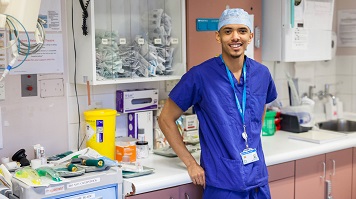Search our site...
Search module
Mehnuhlik Lynch, alumnus, BSc Operating Department Practice
Mehnuhlik Lynch studied for a BSc in Operating Department Practice at LSBU between 2014 and 2017 and now works as an Anaesthetic Practitioner.

Passion
I have always had a passion for working in healthcare. During my teenage years, I qualified and worked as a Pharmaceutical Healthcare Advisor and that was where my drive for working in healthcare started.
Why LSBU?
I decided to study at LSBU because I wanted to pursue a career working in operating theatres and have an active impact on providing specialised care to patients in need. LSBU has an excellent reputation in Health and Social Care and links to world renowned hospitals in the London area. It was a challenging decision to make, as I had to leave my hometown of Luton and move to London permanently to study. I haven’t looked back since.
Gratitude
All of the lecturers who taught me in my course were absolutely wonderful, but I especially wish to express my sincere gratitude to Jackie Kent and Chris Mahoney who were pillars of strength and support throughout my studies.
Specialist areas
My training qualified me to work as a theatre practitioner in three different specialist areas, anaesthetics, surgical scrub and post-operative care (recovery).
Current role
After graduating I secured a role as an anaesthetic practitioner at a South London NHS trust. This entailed working alongside consultant anaesthetists, assisting them in their day to day anaesthetic duties and providing high quality holistic patient-centred care. I originally found out about the job through a mutual friend who was already an operating department practitioner.
After 18 months there I moved on and now work as a Senior Anaesthetic Practitioner and Theatre equipment lead at The London Clinic, which is one of the UK’s largest private hospitals.
Skills required
The skills required to work in the perioperative environment are diverse, and include being able to manage a patients’ airway, understanding and performing correct patient positioning, checking the functionality of anaesthetic and surgical equipment, and also preparing and being responsible for medicines including controlled drugs.
Alongside these are sets of non-clinical skills that I demonstrate every day such as having situational awareness, good communication skills, team working and knowing my own limits.
These skills are just as vital within my role as the clinical skills are.
Dynamic environment
Theatres can be a scary place for most so being able to give emotional support and reassurance to my patients alongside their treatment is what I most enjoy about my job. There is no such thing as a typical day in this role. I could start the day working in paediatrics with children as young as a few weeks old, and by the afternoon be re-allocated to an emergency theatre to help a patient coping with a life-threatening condition. In all, the diversity and patient care is what makes me like this job more and more each day.
The daily challenges of my job are what keep me motivated.
No two days in operating theatres are ever the same, and each day there is something new to learn. An unexpected emergency can happen at any time and require me to adapt my planning and care at a moment’s notice to ensure the best outcome for my patient.
Expectations
In the next five years, I see myself in a management role as a theatre divisional manager, and I intend to further my academic studies in order to achieve this.
Open-minded
The most important thing I’ve learned since graduating, that has helped me in both my personal and professional life, has been to be open-minded and teachable. Always look to learn something new.
Stay focused
My advice to LSBU students is to stay focused and remember the reason why they have chosen to study. Throughout my time at university I would often ask myself these three questions whenever I felt lost:
- Why am I here?
- What do I want to do?
- How am I going to achieve this?
By asking myself these three questions, I was able to stay grounded and focus on my studies. Ultimately this helped me to obtain my biggest achievement, a First Class honours.